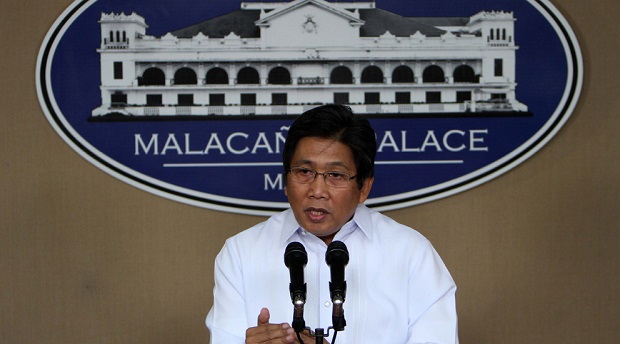MANILA, Philippines–Lives first before jobs.
Malacañang on Tuesday made this appeal to Filipinos in Libya as fighting between rival militias in the north African country intensified.
Communications Secretary Herminio Coloma Jr. said the Philippine government was acknowledging the concerns of the overseas Filipino workers (OFWs) on what awaits them in the Philippines upon their return.
“For sure, there are concerns about their livelihood. But won’t you agree with the proposition that when it is your life that is in danger, we have to value our lives and save ourselves first?” Coloma said at a media briefing.
“If we will continue to rationalize while there are gunshots and death around us, and we still refuse to heed the call for mandatory repatriation and mandatory evacuation, it seems we are gambling with our lives too much,” he said.
But Edgar Paltigera, a material controller at the Hyundai plant in Libya who returned to Manila on Tuesday, said some Filipinos chose to stay in Tripoli because travel along the roads in Libya was becoming extremely dangerous.
The Department of Foreign Affairs (DFA) earlier said most Filipinos in Libya chose to be left behind and face the war since they have “a better chance of surviving there” than in the Philippines.
Only 1,700 signed up
The Philippine government has ordered the mandatory evacuation of all Filipino citizens in Libya amid a worsening security situation.
More than 13,000 Filipinos are working in Libya but Foreign Secretary Albert del Rosario said that only 1,700 so far had signed up for repatriation.
Del Rosario arrived from Tunisia on Sunday where he oversaw the evacuation of the Filipino workers.
He said President Aquino had sent him to Tunisia with an order to ensure that “no one gets left behind.” But Del Rosario conceded that many Filipinos, concerned with their jobs, did not want to leave despite the danger.
A Filipino construction worker had been abducted and beheaded, while a Filipino nurse had been gang-raped as Libya spiraled into uncontrollable clashes between rival militias fighting for control of key population centers.
Libya has been in a volatile situation since an uprising, aided by Nato and the United States, toppled longtime dictator Moammar Gadhafi in 2011.
Another batch
Another batch of returning OFWs from Libya arrived in Manila on Tuesday morning. Most of them recounted sleepless nights amid bombing and shelling almost every day.
The number of repatriated OFWs from Libya has risen to more than 900 as of Tuesday when 49 workers arrived at the Ninoy Aquino International Airport via Emirates Flight EK 336 at 7:05 a.m.
Most of them boarded a passenger ship from the Tripoli seaport en route to Malta to escape the fierce fighting.
On July 20, the DFA raised Crisis Alert Level 4 in Libya, which called for the mandatory evacuation of Filipinos.
The repatriated OFWs, mostly skilled workers from Tripoli and Janzur, were met by officials from the Overseas Workers’ Welfare Administration who briefed them on what to do and how to avail themselves of government assistance upon their arrival.
Wish to go back
Despite the worsening conflict, most of the returning OFWs still wished to go back to Libya if given the chance and if the security situation improves.
“While we were working at the site, we could hear gunshots and explosions just a few kilometers away from our compound,” said Arthur Barcelo, a 51-year-old engineer from Mandaluyong City.
He was working at a power plant of Hyundai in Janzur, 23 kilometers away from Tripoli.
“Whenever there were assaults, we could no longer focus on our work. We feared for our lives. What if we were the ones being fired at?” he said.
Barcelo, however, hoped his employer would still contact him in the next two to three months as soon as the fighting subsides.
“I might come back as long as our safety and security are guaranteed,” said the OFW who had been in Libya for only three months.
Some OFWs who also work for the same company expressed hope that they could find jobs within a few months.
Few opportunities
Like Barcelo, Paltigera believed there were quite a few opportunities for him in the Philippines.
A resident of Cardona, Rizal province, Paltigera said he would have to find a new job somewhere else if returning to Libya was no longer possible. “I am sure our company will find us a job in another place,” he said.
He said his company had shouldered the expenses of their repatriation, including lodging and travel expenses from Tripoli to Manila.
